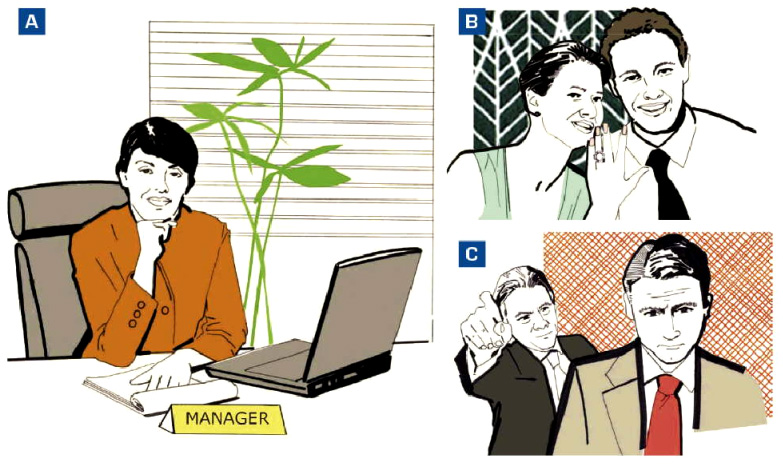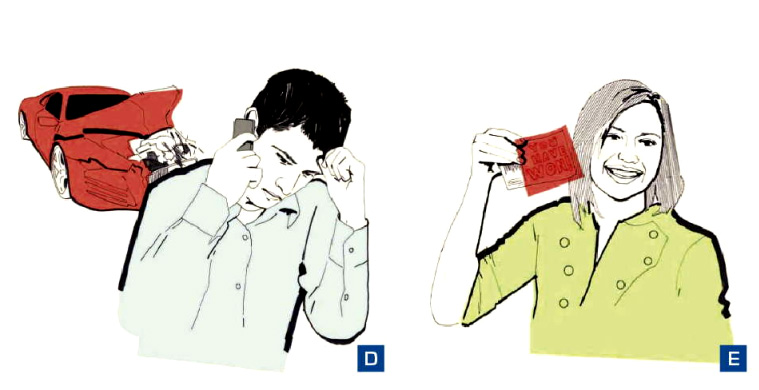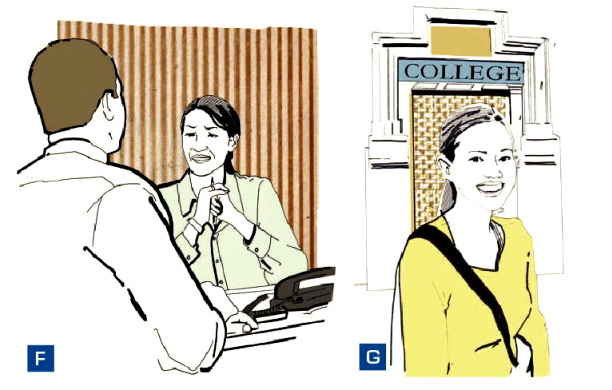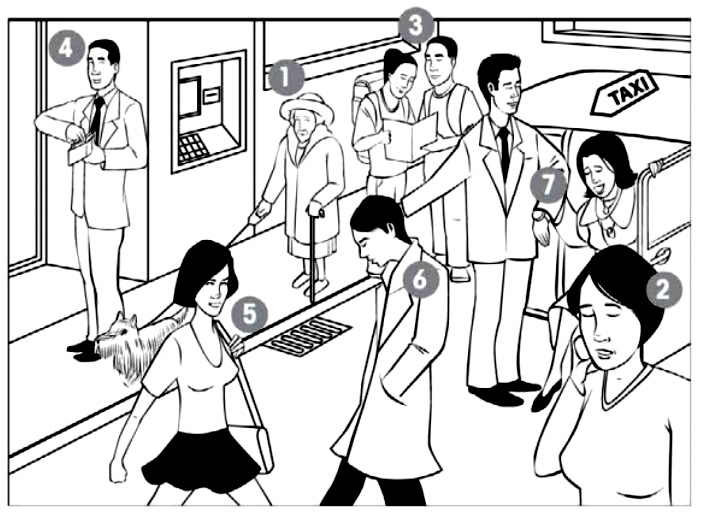Exercise 1
A. Read the definition and listen to the radio program. Answer the questions.
|
therapy the treatment of a mental or physical illness over a long period of time, especially without using drugs or operations: He’s having therapy to help with alcohol addiction. |
1 Which two therapies does the program talk about?
2 The therapies are used in different situations. Which situations are mentioned in the show?
B. Listen again. Are the statements true (T) or false (F)?
1 Eight out of ten people have trouble controlling their anger.
2 With destruction therapy, you use your anger to destroy something in a controlled way.
3 If you think about a situation in which you were angry, the therapy will be more enjoyable.
4 In Spain, some companies pay for their workers to build hotels.
5 In Mexico, they use destruction therapy in hospitals.
6 Laughter therapy can help people to feel less pain.
7 On average, children laugh 100 times a day, and adults laugh seventeen times.
Answer & Audioscript
A
1 destruction therapy and laughter therapy
2 Destruction therapy is used to help people when they are stressed or angry or to help build a team. Laughter therapy is used in hospitals to help people with pain.
B
1 F One out of ten people has trouble.
2 T
3 F The therapy will be more satisfying.
4 F They pay workers to destroy hotels.
5 F They use laughter therapy in hospitals.
6 T
7 F Children laugh about 400 times a day.
Audioscript
R = Radio host C = Clip M = Man P = Professor
R: Welcome to Start the Day!
C: Hello—can I help you? Your call is important to us. Hello—can I help you? Sorry, all our operators are busy at the moment. Please hold.
M: They put you on hold for ages, listening to this terrible music. When you finally speak to someone, you’re so angry, you just want to shout …
R: Anger. We all know the feeling. A report that came out last year shows that people are getting angrier. One in ten people says that they have trouble controlling their temper. Traffic jams, airports, call centers, computer crashes—they can all leave us feeling angry, and anger is difficult to control. Or is it? Professor Miller from The Metropolitan University is here to tell us about two very different therapies to help deal with stress. First of all, destruction therapy. What’s that about?
P: Well, basically, the idea is that a lot of people, when they get angry, they don’t know what to do with their anger— they don’t deal with it very well. They just keep it inside. But, if you don’t deal with your anger, sooner or later it will explode. So, with destruction therapy, you use your anger to destroy something, but in a controlled way. The idea is that, if you do that, it helps you to feel better.
R: OK, I get angry a lot. Can destruction therapy help me?
P: Perhaps. We can try it. What we do is we take you to a place full of old cars. When we get there, I’ll give you a hammer, and you can use it to smash a car to pieces.
R: Really? Is it that simple? If I smash the car to pieces, will I feel better?
P: Yes, a little. But, that’s only the beginning. Then, I’ll ask you to think about a situation in the past when you felt really angry. And, when you think about that anger situation, you’ll hit the car much harder. And the therapy will be much more satisfying. When we finish the session, you’ll feel much better.
R: That’s amazing. And, businesses are using this kind of therapy in Spain, is that right?
P: Yes, there are some old hotels in Spain. You can pay to go and destroy the hotel. So, some companies who feel that their workers are stressed, or they need to build a team, send their workers to destroy the hotel. And it’s a good way for them to get rid of that stress. It works.
R: That’s incredible. But there’s another idea I wanted to ask you about. People say that laughter is the best medicine. And nowadays, laughter therapy is used in hospitals to help people with pain.
P: That’s right.
R: So, how does that work?
P: Well, if people laugh about something, they feel better. On average, children laugh up to 400 times a day, but, when we grow up, we only laugh about seventeen times a day. And it’s not enough because, when you laugh, your body produces chemicals—and these chemicals make you feel happier. And they also make you feel less pain. So, in Mexico, for example, they use laughter therapy in hospitals. A group of people goes around the hospital, visiting the patients, and, basically, they make them laugh, by telling them jokes or doing something funny.
R: And does it really work? Do people feel better afterward?
P: Absolutely! They feel better, and they don’t need medicine.
R: That’s great. So, in Mexico, laughter really is the best medicine?
P: Yes, it looks like it. That’s right …
Exercise 2
A. Listen to seven conversations. Match the conversations to the pictures A—G.



B. Look at the pictures again. What is the good news or bad news in each situation?
Answer & Audioscript
A
1 F 2 A 3 E 4 D 5 G 6 B 7 C
B
A good news – they were impressed with the interview; bad news – they offered the job to someone else
B good news – she split up with her boyfriend; bad news – he’s already engaged to someone else
C bad news – Steve lost his job; good news – he’s going to get $30,000 from the company
D good news – he’s OK; bad news – he crashed the other person’s car
E good news – she won $2,000 in a creative writing competition; bad news – she’s going to spend it all on bills
F good news – he has a new job; bad news – it’s in Germany, so he has to move
G good news – she got in (got accepted) to college; bad news – she’s leaving home
Audioscript
Conversation 1
A: I have something to tell you.
B: What’s that?
A: I’ve been offered a job.
B: Wow! That’s fantastic. Congratulations!
A: There’s one thing I have to tell you though.
B: Really? What’s that?
A: The job is in Germany. I’m moving at the end of the month.
B: That’s awful. What am I going to do?
A: I have to go. I hope you understand.
B: I see.
Conversation 2
A: Hello. You came in for a job interview last week.
B: Yes, that’s right.
A: First, I’d like to say that we were very impressed with your interview.
B: Oh. Thank you.
A: However, I’m sorry to have to tell you, but we’ve offered the job to someone else.
B: Oh. That’s a shame. Thank you, anyway.
A: I’m afraid the other candidate had more experience.
B: I understand.
A: But, we’d like to keep your details, in case another job comes up in the future.
B: OK.
Conversation 3
A: You’ll never guess what.
B: What?
A: I just won some money in a creative writing competition.
B: You’re joking?
A: No, really.
B: That’s amazing! How much did you win?
A: Two thousand dollars.
B: You lucky dog! How fantastic! How are you going to spend it?
A: Actually, I have so many bills to pay. I’ll spend it on that.
B: Well, it’s good news anyway.
Conversation 4
A: I’m afraid I have some bad news.
B: What is it?
A: I had an accident. I crashed the car.
B: Oh, no. That’s terrible. Are you OK?
A: Yes, I’m fine.
B: That’s good.
A: But, I’m afraid the car isn’t.
B: Oh, that doesn’t matter. You can get the car fixed.
A: Unfortunately, it was your car.
B: My car? You mean you crashed my car? How did that happen?
A: Well, you see I …
Conversation 5
A: Dad, I have some good news for you.
B: What is it?
A: Well, you know I was waiting to hear from the college?
B: Yes.
A: Well, … I’m really pleased to tell you that … I got in!
B: That’s wonderful news, dear! Good for you. I’m so happy for you.
A: There’s only one problem though …
B: What’s that?
A: It means I’m leaving home.
B: Well, of course we’ll miss you, but it’s fantastic news.
Conversation 6
A: There’s something I have to tell you.
B: What’s the matter?
A: I split up with Fabio.
B: Oh, no! That’s terrible. I’m really sorry to hear that.
A: No, it’s OK actually. I’m happy about it, but guess what?
B: What?
A: He already has a new girlfriend.
B: No! That’s really annoying.
A: Yeah, and they got engaged.
B: You’re joking!
Conversation 7
A: Bad news, I’m afraid.
B: What is it?
A: Steve lost his job.
B: Oh, no. That’s awful. I’m really sorry to hear that.
A: Do you want to hear the good news though?
B: Yes.
A: The company is paying him thirty thousand dollars.
B: Really?
A: He’s going to travel around the world.
B: That’s amazing!
Exercise 3
A. Listen to a man talking about a special weekend. Which of the following statements is not true?
1 His brother organized a surprise weekend away.
2 They went on a boat trip to a lighthouse and slept there.
3 They went shopping with his brother’s money.
4 They went to the theater and then ate an expensive five-course meal.
Answer & Audioscript
4 is not true. (They went to a blues concert.)
Audioscript
One of the most, er, memorable moments, or not moments, rather events, in my life … was a couple of years ago. It all started one day when I was at work, and my brother phoned me out of the blue and said, um, “What are you doing the weekend of September 23rd?” or whatever it was. And I said, “I don’t know.” He said, “Well, reserve a flight to Norway.” My brother lives in Norway, and I live in Boston. So, I said, “Why?” He said, “Oh, I’ll let you know when you get here—it’s a surprise.” So, weeks went on, and I tried to work out what this could be. But, I had absolutely no idea. So the weekend in question came around … I went to the airport, got on my flight, and I was met there by somebody I’d never met before. He just came up and said, “Are you Steve?” I said, “Yes.” And he said, “OK. Come with me.” So, I went with him to the car. We drove for a little while, and I tried to kind of get it out of him where we were going, but he wouldn’t tell me anything. He pulled up outside a hotel, and there was my brother and my half brother, and my two half sisters there waiting for me. I was thinking “What on earth is going on?” And my brother just said, “I realize we don’t spend enough time together, so I’ve gathered you all here and planned a weekend for you.” We’re like “Oh, cool! So, what are we doing?” “I’m not telling you.” “OK, fine.” Next thing, we got on a boat and, er, he took us out to a lighthouse. And we spent the first night eating Norwegian shrimp and drinking beer, and we slept in a lighthouse. The next morning, we got up and drove off in his car. We said, “Where are we going?” He said, “I’m not telling you.” He took us to a local shopping mall and said, uh, “I realize I’ve done OK in life. I’ve done better than you guys. Here have a load of money. I want you all to go shopping and buy stuff that you wouldn’t normally buy with this money.” He said, “The one condition is you’re not allowed to buy a gift for me or my family.” So off we went in different directions, spent all his money, and, bought some very nice things, and met back up again. In the evening, he took us out to a blues concert. Then he took us for a five course meal. And, we spent that night in a very nice hotel. The next morning we had breakfast, and I got back on a plane and went back to Boston. Yeah, that weekend is one of my happiest memories.
Exercise 4
A. Listen to the introduction to a radio program. What is the topic?
B. Look at the picture. Which people do you think are ‘potential victims’? Why?

C. Listen to the rest of the program and check.
D. Listen again and complete the notes.
POTENTIAL VICTIM?
1 Woman with dog: …No…, because dogs are …unpredictable… .
2 Woman on cell phone: …………………, because she isn’t ……………………………………………………… .
3 Tourists looking at map: …………………, because they are concentrating on the map, not ……………………………………………………… .
4 Man leaving ATM: …………………, because he didn’t put the money ……………………………………………………… .
5 Woman in mini-skirt: …………………, because of her positive ……………………………………………………… .
6 Big man in coat: …………………, because he’s looking at his feet and he doesn’t know ……………………………………………………… .
7 Couple leaving taxi: …………………, because rule number one of the street is: if you have anything valuable, ……………………………………………………… .
Answer & Audioscript
A
The topic is what kind of people are likely to be victims of crime.
B C
2, 3, 4, 6 and 7 are potential victims.
D
2 Yes, (because she isn’t) paying attention to what’s happening around her. She isn’t looking at other people.
3 Yes, (because they are concentrating on the map, not) the people around them.
4 Yes, (because he didn’t put the money) in his wallet quickly.
5 No, (because of her positive) body language. She’s confident, she knows where she’s going, she’s looking straight ahead, and she’s probably moving fast.
6 Yes, (because he’s looking at his feet and he doesn’t know) who’s around him.
7 Yes, (because rule number one of the street is: if you have anything valuable,) don’t show it.
Audioscript
A
In the eyes of street criminals, everybody communicates something. Some people communicate strength and power; others communicate “I am a victim.” Researchers Jean A. Hampton and Robert Ealey asked convicted criminals to watch a secret video of a street scene and then say which people looked like possible victims of a crime. They did it easily. The potential victims, surprisingly, were not always small women; sometimes they were big men. For this interview, Robert Ealey looked at this picture of a street scene and explained which people were potential victims.
C
I = Interviewer E = Robert Ealey
I: So which of these people would a criminal go for?
E: Not the ones you think.
I: Can you explain?
E: Yeah, so for example, you’ve got an old woman, see?
I: Yes.
E: So, you’re a criminal. You might think, OK, this old woman is small and weak. She’s not going to fight me or give me any trouble. But who’s she with?
I: She’s with a dog.
E: That’s right. And the thing about dogs is they are unpredictable. And the last thing you want if you’re a criminal is unpredictability. You have about five seconds maximum to commit the crime, and you don’t want any surprises, OK? So you leave the old woman.
I: Right. Is that really the length of time for a street crime?
E: Five seconds? That’s the maximum. Most street crimes take maybe two seconds. Then it’s over.
I: Wow.
E: OK, so let’s take someone else. There’s a woman talking on a cell phone.
I: Yes, I see her.
E: Easy victim or not?
I: Well, if she’s talking on a cell phone, she could tell her friend what’s happening, right?
E: And then what?
I: Um, the friend calls the police?
E: And do you think the police are going to get there in five seconds?
I: Well, no.
E: No, this woman on the phone is a potential victim. The phone doesn’t matter. The reason she’s a potential victim is that she isn’t paying attention to what’s happening around her. She isn’t looking at other people. She’s distracted.
I: I see.
E: The same with the tourists looking at the map.
I: Right.
E: They’re concentrating on the map, not the people around them. This also tells the criminal that these people are lost and don’t know what they’re doing.
I: But there are two of them, so maybe a criminal would hesitate?
E: Maybe, but don’t forget, it takes half a second to steal something and run. OK, what about the man at the ATM?
I: The guy taking cash out of the bank?
E: What’s he doing wrong?
I: Well, if it were me, the cash would be in my wallet before I turned around.
E: That’s right. He’s basically saying, “Look at me, I’ve just taken out lots of money, and I’m too stupid to put it in my wallet quickly.” He’s a criminal’s dream. What about the woman in a mini-skirt?
I: Well, she’s attractive, and … I don’t know. She’s not exactly, big and strong, either. Maybe a victim?
E: But look at her body language. She’s confident, she knows where she’s going, she’s looking straight ahead, and she’s probably moving fast. No criminal would go for her.
I: That’s interesting. So body language is pretty important.
E: It’s extremely important. Look at the man in the coat. Big man, probably strong, but what’s his body telling us?
I: He’s not focusing.
E: Yes, that’s right. He’s looking at his feet. He doesn’t know who’s around him. Any criminal will think, “Nice coat, probably a fat wallet in there, full of money, and he’s not concentrating.” The key for a street criminal is surprise. It doesn’t matter who the victim is; if you can surprise them, they have no chance.
I: The couple leaving the taxi?
E: Rule number one of the street: if you have anything valuable, don’t show it. This man’s wearing an expensive watch that everyone can see. The other thing is, people leaving cars are always in a weak position. They aren’t standing up properly, and they aren’t aware of who else is on the street.
Related Posts
- Practice Listening English Exercises for B1 – World
- Practice Listening English Exercises for B1 – History
- Practice Listening English Exercises for B1 – Communities
- Practice Listening English Exercises for B1 – Success
- Practice Listening English Exercises for B1 – Solutions
- Practice Listening English Exercises for B1 – Jobs
